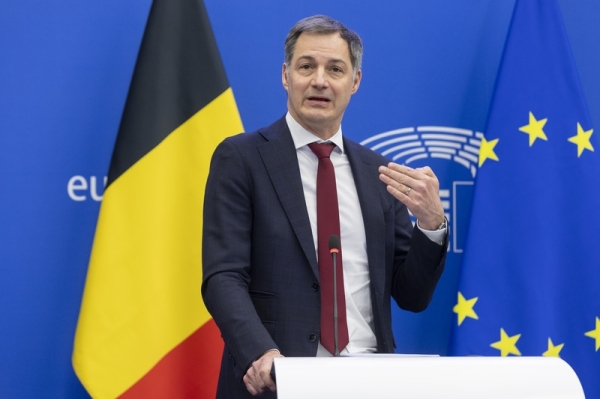Belgium declares war on MEPs who took Russian ‘cash’
Belgian spies have evidence MEPs took Russian money, Belgium’s prime minister has said, while announcing a potentially explosive judicial inquiry.
"Moscow approached MEPs, but also paid, to promote Russian propaganda here," said Belgian prime minister Alexander De Croo in Brussels on Friday (12 April).
"The cash payments did not take place in Belgium, but the [illegal foreign] interference does," he added.
"On the national level, our judicial authorities have now confirmed this interference is subject to prosecution," he also said.
Belgium’s domestic spy agency, the VSSE, obtained the evidence in a joint sting with Czech and Polish intelligence services.
"Belgian intelligence services have confirmed the existence of a pro-Russian interference network with activities in several European countries and in Belgium," De Croo said.
Belgium had a duty to act because the VSSE was treaty-bound to protect EU institutions in Brussels from hostile espionage.
"As Belgium is the seat of the EU institutions, we have a responsibility to uphold every citizen’s right to a free and safe vote," De Croo said.
Belgium also currently holds the rotating EU presidency, giving added symbolism.
And its VSSE is the current presidency holder of the Club De Berne, an informal European intelligence-sharing forum, enlarging its role.
Belgium’s judicial enquiry into what some media have dubbed ‘Russiagate’ could lead to arrests and jail sentences.
The VSSE quietly expelled 41 suspected Russian spies from Belgium in 2022 after Russia’s invasion of Ukraine.
But judicial investigations make evidence and names public in the end.
They also threaten to uncover other crimes beyond the initial charges, once Belgian sleuths get to work, posing questions about who else in Brussels other than a few fringe MEPs might be exposed by the Russia probe.
For his part, De Croo said he had briefed EU officials at the highest level about his intentions.
He had personally spoken to European Commission president Ursula von der Leyen and European Parliament president Roberta Metsola about Belgium’s Russia probe, De Croo told press on Friday.
Belgium also opened an investigation into the Qatargate bribery scandal in the EU Parliament in 2022.
It led to the detention of a prominent Greek MEP in Brussels, but has been marred by errors and fiascoes, and remains ongoing more than one year later.
With that in mind, De Croo voiced a special sense of urgency on Russia on Friday, saying: "Within two months, the people of the EU will head to the ballot boxes".
"These are serious concerns and that is why I have taken action," he said.
"We need to act on an EU level," he added.
He proposed involving Europol (the EU’s joint police agency in The Hague), the European Public Prosecutor’s Office, and EU anti-fraud agency Olaf.
And Belgian diplomats wanted De Croo’s announcement to make a big splash, promising "there will be news" at the PM’s press conference on Friday, together with a winky-eye emoji, in their invitation to international correspondents.
MEPs want names
For its part, the EU Parliament can do little more than impose modest fines on MEPs who failed to declare payments from third parties.
But if De Croo spoke with Metsola, then many EU deputies will want to know what he said.
"We demand the names, the numbers, who was paid, which party, by which intermediary, for which objective, and how much," said French liberal MEP Valérie Hayer in a plenary debate in Brussels on Wednesday.
"People have a right to know if they are voting for honest candidates or bought candidates," fellow French liberal Nathalie Loiseau also said.
The Russiagate affair broke on 27 March, when Czech and Polish spy services BIS and ABW said they had evidence tens of thousands of euros in secret Russia payments went to MEPs and MEP-candidates.
Payments were made via Voice of Europe, a pro-Russian media based in Prague and owned by a pro-Kremlin oligarch, they said.
Suspicion has centred around far-right MEPs who gave interviews parroting Russian propaganda on Ukraine.
But several of those caught up in speculation have stridently denied wrongdoing.
"Any accusations of me being payed or being ‘promoted’ are ridiculous", Belgian far-right MEP Tom Vandendriessche previously told EUobserver, for instance.
Russiagate was "part of a coordinated attempt to … discredit the nationalist and conservative opposition", ahead of the EU election, Vandendriessche claimed.

